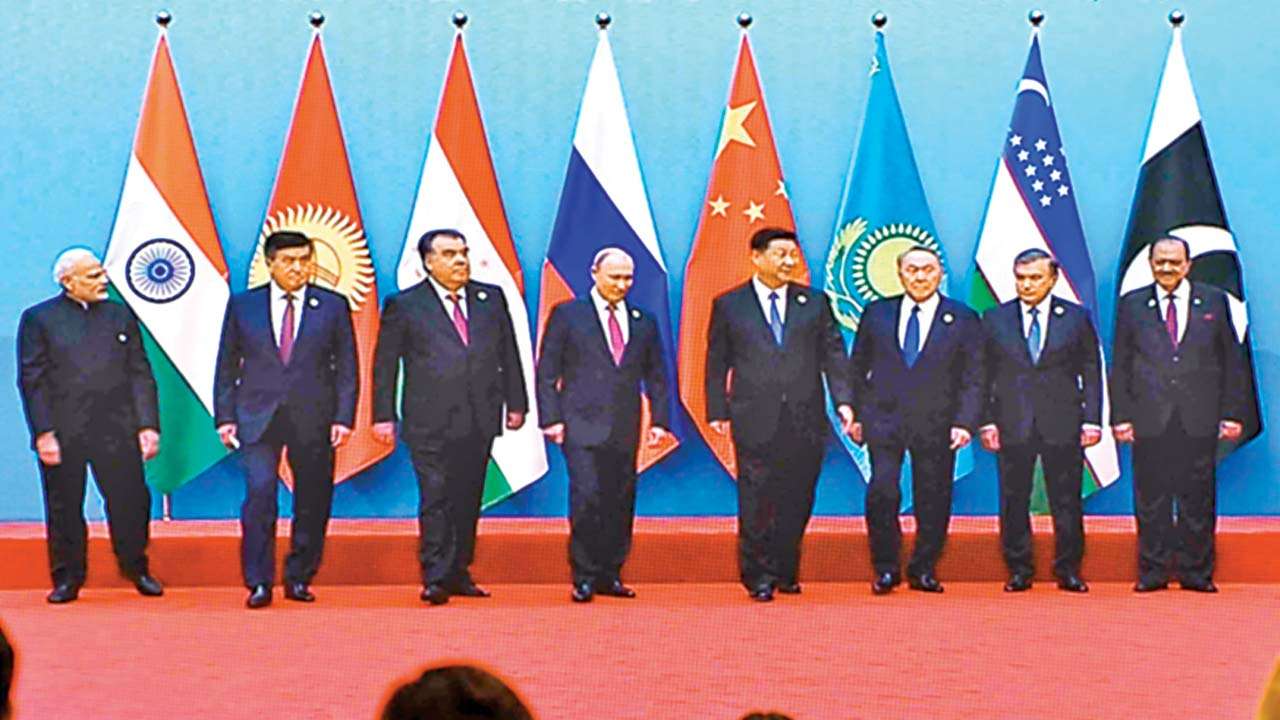
India’s participation in the Shanghai Cooperation Organisation (SCO) summit in Qingdao, China, on June 9-10 has revived the debate over the usefulness of this membership for the country’s foreign policy, economic development, security goals and Sino-Indian relations.
The question has been debated since 2009, when India and Pakistan attended the summit as observers in Russia’s Yekaterinburg; and India showed interest in joining the SCO. It was in June last year at the SCO summit in Astana, Kazakhstan, that India and Pakistan became full members of the China-led grouping.
This year’s summit was the first for India and Pakistan as full members and where Prime Minister Narendra Modi met Pakistan’s President Mamnoon Hussain. Predictably enough, there arose an ‘India-Pakistan issue’ — the China-Pakistan Economic Corridor (CPEC) — which made PM Modi hold off support to China’s Belt and Road Initiative (BRI).
Long before the process for admission of India and Pakistan to the SCO was initiated, it was conveyed to observer-participants from the two countries that they would have to desist from their mutual hostility and bilateral issues finding expression in this grouping. In fact, it is stated to have been a sort of precondition because most forums where India and Pakistan are members — for example, SAARC and CHOGM — are hostage to their diatribes against each other. When the then PM Manmohan Singh met Pakistan President Asif Ali Zardari at the SCO summit in Yekaterinburg, he talked to him about Pakistan being used for terrorism.
Similarly, India’s refusal to back China’s BRI is because of the Pakistani dimension (CPEC) to the project. The SCO decisions and declarations are consensus-based. The departure at Qingdao was that while the eight full members signed the 17-page Qingdao Declaration, India opted out as a signatory from the section “reiterating support for China’s BRI”, which was signed only by the other seven, namely, Pakistan, Kazakhstan, Uzbekistan, Kyrgyzstan, Tajikistan, Russia and China.
China and Pakistan are “iron brothers” and all-weather friends. Therefore, it is unlikely that unless economic or security reasons compel Beijing to abandon the CPEC, this corridor — which has a bearing on India’s sovereignty and territorial claims — will remain a part of the BRI. That being the case, in the China-led and China-driven SCO, sooner rather than later, India may have no choice but to extend its support to the BRI. In that event, India would, at a time of its choosing, make it a matter of some hard bargaining and strategic trade-offs.
Besides, there are other reasons, which places India on a different footing in the SCO. Six of them are enthusiastic beneficiaries of China’s BRI. Out of the six, the five Central Asian republics, formerly of the Soviet Union, are sandwiched in every sense — physical, political, geo-economic, geo-strategic and security-wise — between Moscow and Beijing. In fact, the SCO is intended to provide the BRI with over-arching security architecture. When it comes to anti-terrorist strategies and operations, China and Russia have much in common, including the support of the Central Asian countries, the ISIS as a “common enemy”, and the threat posed by jihadi groups sneaking in from West Asia; whereas the biggest terrorist threats facing India can be traced to Pakistan. The BRI seeks to lock in the Central Asian republics between China and Russia, especially to thwart jihadi militants from entering China’s Xinjiang Autonomous Region, where Beijing is facing serious problems with Muslim groups.
There is also no basis to assume that SCO membership would in any way make for better Sino-Indian relations. In fact, relations between India and China took a dive for the worst immediately after India became a member of the SCO at its Astana summit. The stand-off in Doklam came soon after Prime Minister Modi and Chinese President Xi Jinping had “cordial and friendly” exchanges on the sidelines of the Astana summit.
It was in Astana, on June 9, after the Modi-Xi talks that Foreign Secretary S Jaishankar stated: “There was an understanding that where we have differences, it was important that differences should not become disputes, and in fact, if they were handled well, could even become opportunities.” At Astana, there were no references to India’s NSG membership, opposition to OBOR or any contentious issue. On CPEC, Jaishankar said that it need not be an obstacle for the two countries to work with each other as Xi and Modi felt that “where we have differences, (the point is) how do we work through those differences, find common ground where they are possible”. The military face-off in Doklam came close on the heels of these expressions of resolve and good intent, thus raising serious questions about their sincerity. If Doklam erupted after Astana, just a month before that SCO summit, India had boycotted the BRI forum held in Beijing.
For all that, after the informal meeting between Modi and Xi in Wuhan, it was felt that the state of play between India and China is changing in dramatic ways; and, along with that, the template of bilateral relations and priorities are also being recast. None of these are in any way linked to India’s membership or role in the SCO. That is more than reinforced by the bilateral meeting between Modi and Xi and the trade agreements, which signify an opening of the Chinese market for Indian rice and other products. India’s opposition to the BRI did not deter the two sides from working to deepen economic ties and agreeing on another informal meeting to reduce mistrust.
At a larger level, India’s rivalry with China for supremacy in Asia, its position on the South China Sea, the goal of building a strong Indo-Pacific community and the effort for reviving the Quadrilateral underscore that the SCO is not a key determinant of Sino-Indian relations.
The author is an independent political and foreign affairs commentator based in New Delhi. Views expressed are personal.